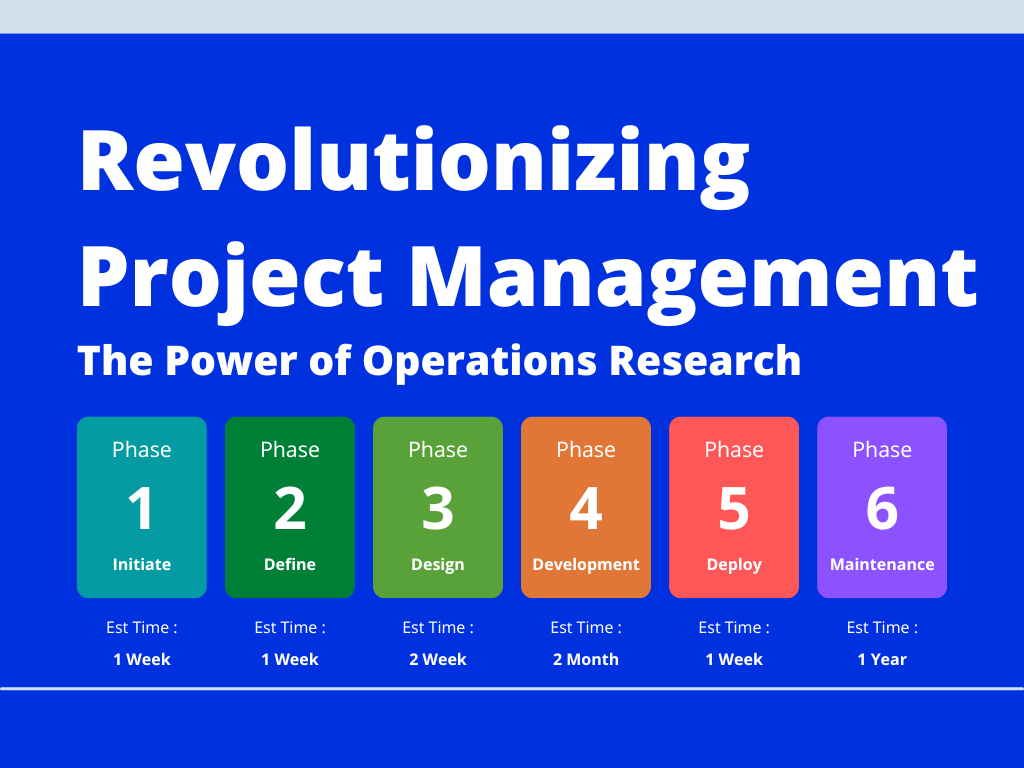
Get Success with Operations Research in Project Management
Are you a student considering a Distance PGDM in Project Management? If so, you’re about to read about the exciting journey that could transform your career. One of the most powerful tools you’ll encounter in your studies is Operations Research (OR).
What is Operations Research?
Operations Research is a scientific approach to decision-making and problem-solving. It uses advanced analytical methods to help organizations make better decisions and improve their operations. In project management, OR techniques can be applied to optimize resource allocation, schedule tasks more efficiently, and manage risks more effectively.
The Marriage of Operations Research and Project Management
Project management is about delivering results on time, within budget, and to the required quality standards. Operations Research provides project managers the tools to achieve these goals more consistently and efficiently. Let’s explore some key areas where OR makes a significant impact:
Resource Allocation
One of the biggest challenges in project management is allocating resources effectively. OR techniques like linear programming can help you:
- Determine the optimal distribution of resources across different project tasks
- Maximize productivity while minimizing costs
- Identify potential resource conflicts before they become problems
Risk Management
Projects are inherently risky, but OR can help you navigate these uncertainties:
- Use Monte Carlo simulations to assess the likelihood of different project outcomes
- Develop contingency plans based on quantitative risk analysis
- Make more informed decisions about risk mitigation strategies
Scheduling
Efficient scheduling is crucial for project success. OR techniques can help you:
- Create more accurate and realistic project timelines
- Identify critical paths and potential bottlenecks
- Optimize task sequences to minimize project duration
Why Distance PGDM in Project Management Students Need to Master OR
As a student pursuing a Distance PGDM in Project Management, understanding and applying OR techniques can set you apart in a competitive job market. Here’s why:
- Increased Employability: Many top companies seek project managers who can apply analytical techniques to complex problems. You’ll become a more attractive candidate for high-level positions by mastering OR.
- Better Decision-Making: OR equips you with the tools to make data-driven decisions. This skill is invaluable in today’s business environment, where gut feelings are insufficient to justify significant project decisions.
- Improved Project Outcomes: By applying OR techniques, you’ll be able to deliver projects more successfully, consistently meeting or exceeding stakeholder expectations.
- Career Advancement: As you demonstrate your ability to use OR to drive project success, you’ll be well-positioned for rapid career advancement and leadership roles.
“Operations Research in project management is not just a nice-to-have skill; it’s becoming a must-have for success in the field.” – Industry Expert
Real-World Applications of OR in Project Management
Let’s look at some practical examples of how OR is being used in project management today:
Construction Industry
A large construction firm used OR techniques to optimize resource allocation across multiple projects. By applying linear programming models, they were able to:
- Reduce idle time for expensive equipment by 25%
- Improve overall project completion times by 15%
- Increase profit margins by 10% through more efficient use of resources
Software Development
A tech startup applied OR techniques to their agile development process. Using queuing theory and simulation models, they:
- Reduced sprint planning time by 30%
- Improved sprint velocity by 20%
- Decreased the number of unplanned tasks by 40%
Event Planning
A significant event planning company used OR to optimize its logistics for a large international conference. Through the application of network flow models, they:
- Reduced transportation costs by 18%
- Improved attendee satisfaction scores by 25%
- Decreased setup and teardown times by 30%
How to Get Started with OR in Your Distance PGDM Program
If you’re excited about the potential of OR in project management, here are some steps you can take to dive deeper:
- Focus on the Math: Pay special attention to the mathematical foundations of OR in your coursework. Understanding the underlying principles will help you apply OR techniques more effectively.
- Practice with Real Data: Don’t just study the theory. Look for opportunities to apply OR techniques to real-world project data, even if it’s just hypothetical scenarios provided in your course.
- Learn OR Software: Familiarize yourself with popular OR software tools like LINDO, CPLEX, or even Excel’s Solver add-in. Practical experience with these tools will be valuable in your future career.
- Seek Out Case Studies: Look for real-world examples of OR applications in project management. Analyzing these cases will help you understand how OR principles are applied.
- Network with Professionals: Connect with project managers using OR in their work. Their insights can provide valuable perspective on how OR is changing the field.
Conclusion: Embrace the Power of OR in Your Project Management Career
As you progress through your Distance PGDM in Project Management, remember that Operations Research is more than another course topic. It’s a robust set of tools that can transform how you approach project management challenges.
By mastering OR techniques, you’ll be well-equipped to tackle complex projects, make data-driven decisions, and deliver exceptional results. This expertise will make you a more effective project manager and open doors to exciting career opportunities in the future.
So, embrace the power of Operations Research in your studies and future career. It’s an investment that will pay dividends throughout your professional journey in project management.



